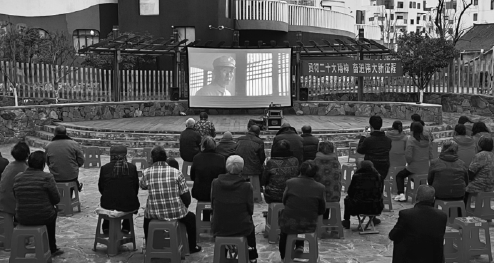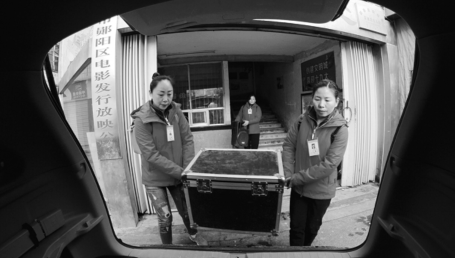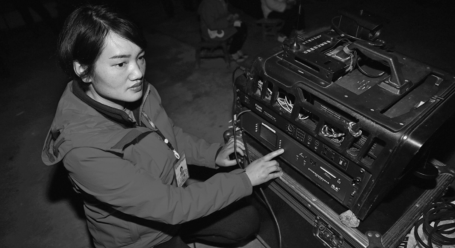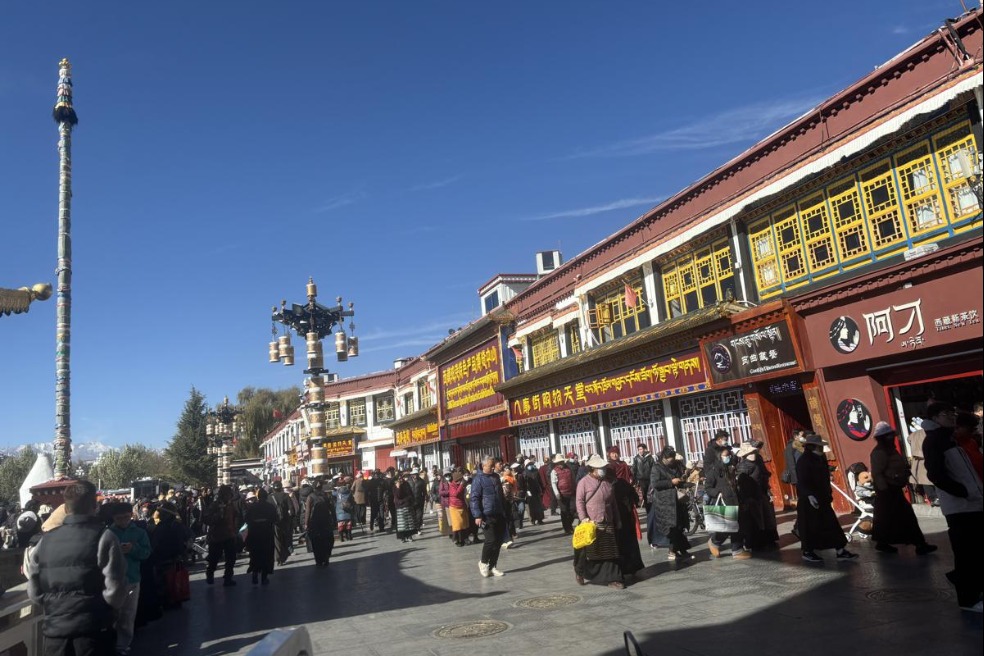Heroes of the big screen
Team of women works hard to ensure that rural residents get to enjoy some movie magic, Xu Lin and Zhou Lihua report in Wuhan.

As the sun begins to drop, there's a lively bustle in the remote mountain village.
The serenity of the evening is pierced by a loudspeaker broadcasting the message that the open-air film screening is about to start, as villagers arrive at a small square, one after another, each carrying their own stools.
While watching movies, they crack and eat melon seeds and discuss the plot with each other, making for a lively scene.
"I particularly enjoy watching war movies. They remind me of my old comrades, making me cherish my current happy life even more," says villager and retired soldier Ming Tingmao.
It's a regular entertainment for rural dwellers in Yunyang district, Shiyan city, Central China's Hubei province.
In 2007, the district's film distribution and exhibition corporation formed a group of female projectionists, responding to the nation's call of "bringing culture to the countryside".
Each person in the group is in charge of a specific area, ensuring that every village has the opportunity to watch movies once a month. In the years since the group's inception, the number of movie screenings has exceeded 45,000, benefiting all of the villages in the district.
"I've traveled to many places and interacted with various people, and I could never have had such an experience in the city. I'm proud that what I bring to the villagers is nourishment for the mind, enriching their leisure time and lives," says Xiong Yan, 46, who joined the team when it was founded.
Formerly a projectionist at a cinema in the city, she notes that the difference between her old job and her current calling is that, while showing outdoor movies in the rural areas, she can interact directly with the audience and observe their immediate reactions up close.
"My colleagues and I had grown up in the city and were not accustomed to the rural environment at first. Now we have become strong, capable women, who can lift the 50 kilograms of equipment off the vehicle on our own," she says. She has learned how to identify different farm crops, and also helps villagers do farm work, such as digging up peanut plants and harvesting wheat.
The team's annual work cycle runs from March to early October, due to safety concerns. In the other months, the weather in the mountainous areas is cold, making the road slippery and dangerous to travel on.
Prior to organizing the movie screenings, they solicit opinions from villagers to create a movie list and then post the detailed information on a board as a public notice. Villagers prefer feature films, particularly those with a revolutionary theme, police and gangster movies, comedies and traditional operas.
Some elderly people like to watch films, but they have mobility issues, so the team visit their houses to give them personal movie screenings.
The projectionists have to move equipment, erect the big screen, connect the power supply, set up the sound system and adjust the projector. At the interval between the two movies, they routinely show a short educational film, with subjects ranging from traffic safety and telecom fraud to fire prevention.
No obstacle too great
Traffic used to be the biggest headache, as the projectionists had to trek over mountains to reach the remote villages. The situation improved greatly when Xiong bought a car in 2020, for both safety and convenience.
Before that, she rode a motorcycle along the rough mountain paths, carrying her own clothing and other articles of daily use. At the same time, she put the equipment, including a projector and a large screen, on a bus and fetched it at the final stop in Baoxia.
The town is about 70 kilometers from her home, over 40 minutes by car. However, before the construction of the highway, it would take over two hours by bus, and there were only a few scheduled buses, meaning that she often had to wait for a long time.
As always, she has to visit all villages of the town within a year, and will stay in a village for about three days before moving on to the next, with her luggage and the projection equipment.
"It's physically demanding to transport the heavy equipment between villages, but as the economic condition of these rural areas has greatly improved in recent years, the village head will often send a car to carry the equipment to the town," she says. Before that, she had to pay a taxi service or seek help from villagers.
Back in 2012, when she went to one remote village, the equipment was transported up the rough, winding hillside track on the back of a mule — a crucial means of transportation for those who lived on the top of the mountain.
"After some heavy rainfall, a large rock blocked the way. The villagers were all elderly people, who were very grateful that I overcame the obstacles and made it to the village to show movies for them," she says.
Six years later, when she returned to the village, she was amazed to find a cement road had been laid. The villagers had been relocated to more convenient homes, and many young people had become comfortably well-off through hard work in the cities.
Hospitality abounds
"Besides the greatly improved road conditions, over the years, I've witnessed significant improvement in the living conditions of the villagers, thanks to national policies, such as targeted poverty alleviation," Xiong says.
She travels among different villages, staying overnight at the villagers' houses, and only has time to go home once a month.
In the past, villagers lived in dilapidated cottages and it was not convenient to take a shower. Nowadays, they have new houses, equipped with solar water heaters and other modern household appliances.
"They're always hospitable. Even when they were poor, they always invited me to stay in their houses and gave me the best local specialties they had," Xiong recalls.
Hu Qin, 37, who joined the female projectionist team in 2013, agrees.
In 2019, when Hu was pregnant for over three months, she stayed at the home of the village head while she was in charge of showing movies there.
When the village head's wife accidentally found out about Hu's pregnancy, she started to make different dishes made with eggs laid by the family's hens, which are believed to provide good nutrition for pregnant women. She also helped Hu with showing the movies and gave Hu a box of milk and some cakes when Hu left the village.
In order to continue the screening work, Hu would bring nutritional supplements with her every time she went to the countryside. She continued right up until two months before she gave birth to her son, at which point she finally handed over her screening duties to another projectionist.
Sense of nostalgia
It was not until the late 1980s that color television sets started to become widespread in the country.
Until then, watching open-air movies was an essential form of entertainment for those living in the rural areas in China.
Crowds of people would finish their farm work early and gather together excitedly, waiting for the projectionist to show the movie.
"It's convenient to watch movies on television or even smartphone, but watching open-air movies makes the elderly feel nostalgic about the past. It's also an important social activity for them, as they like to make chitchat with each other," Hu says.
Some told Hu that, when they were young, they would trek over mountains for hours at night to go and watch an open-air movie.
She recalls that, once, she was showing a revolution-themed movie, when an old man in his 90s told her he was a Red Army soldier. He told stories about how they endured great hardships during wartime and showed a scar on his leg caused by a bullet, with tears in his eyes.
"The public approbation and enthusiasm of villagers have encouraged me greatly. They like to chat with me and some will call me to ask the date of the next screening," Hu says.




Today's Top News
- Judicial reform critical for modernizing governance
- Effective use of investment emphasized
- China's shuttle diplomacy strives to reach ceasefire
- Nanjing Museum's handling of donated art, relics being probed
- Key role of central SOEs emphasized
- New travel program hailed as 'milestone'






























